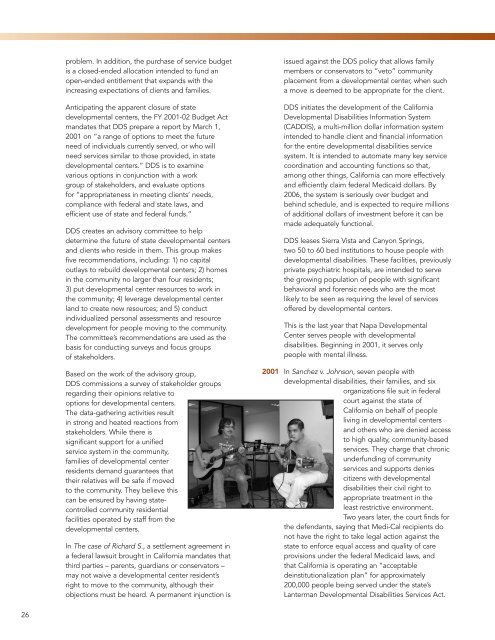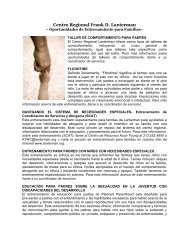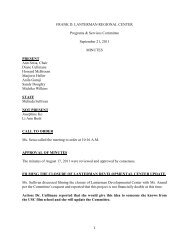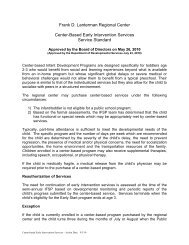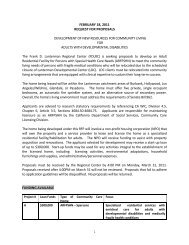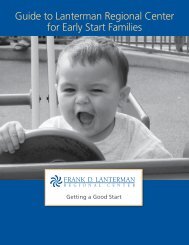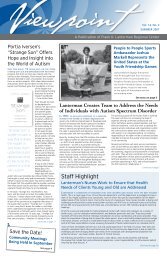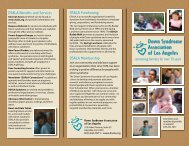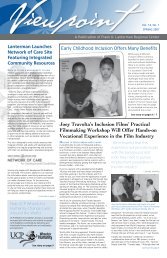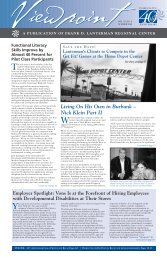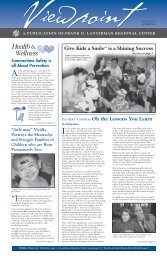40th History Brochure-r2 - Frank D. Lanterman Regional Center
40th History Brochure-r2 - Frank D. Lanterman Regional Center
40th History Brochure-r2 - Frank D. Lanterman Regional Center
You also want an ePaper? Increase the reach of your titles
YUMPU automatically turns print PDFs into web optimized ePapers that Google loves.
problem. In addition, the purchase of service budgetis a closed-ended allocation intended to fund anopen-ended entitlement that expands with theincreasing expectations of clients and families.Anticipating the apparent closure of statedevelopmental centers, the FY 2001-02 Budget Actmandates that DDS prepare a report by March 1,2001 on “a range of options to meet the futureneed of individuals currently served, or who willneed services similar to those provided, in statedevelopmental centers.” DDS is to examinevarious options in conjunction with a workgroup of stakeholders, and evaluate optionsfor “appropriateness in meeting clients’ needs,compliance with federal and state laws, andefficient use of state and federal funds.”DDS creates an advisory committee to helpdetermine the future of state developmental centersand clients who reside in them. This group makesfive recommendations, including: 1) no capitaloutlays to rebuild developmental centers; 2) homesin the community no larger than four residents;3) put developmental center resources to work inthe community; 4) leverage developmental centerland to create new resources; and 5) conductindividualized personal assessments and resourcedevelopment for people moving to the community.The committee’s recommendations are used as thebasis for conducting surveys and focus groupsof stakeholders.Based on the work of the advisory group,DDS commissions a survey of stakeholder groupsregarding their opinions relative tooptions for developmental centers.The data-gathering activities resultin strong and heated reactions fromstakeholders. While there issignificant support for a unifiedservice system in the community,families of developmental centerresidents demand guarantees thattheir relatives will be safe if movedto the community. They believe thiscan be ensured by having statecontrolledcommunity residentialfacilities operated by staff from thedevelopmental centers.In The case of Richard S., a settlement agreement ina federal lawsuit brought in California mandates thatthird parties – parents, guardians or conservators –may not waive a developmental center resident’sright to move to the community, although theirobjections must be heard. A permanent injunction isissued against the DDS policy that allows familymembers or conservators to “veto” communityplacement from a developmental center, when sucha move is deemed to be appropriate for the client.DDS initiates the development of the CaliforniaDevelopmental Disabilities Information System(CADDIS), a multi-million dollar information systemintended to handle client and financial informationfor the entire developmental disabilities servicesystem. It is intended to automate many key servicecoordination and accounting functions so that,among other things, California can more effectivelyand efficiently claim federal Medicaid dollars. By2006, the system is seriously over budget andbehind schedule, and is expected to require millionsof additional dollars of investment before it can bemade adequately functional.DDS leases Sierra Vista and Canyon Springs,two 50 to 60 bed institutions to house people withdevelopmental disabilities. These facilities, previouslyprivate psychiatric hospitals, are intended to servethe growing population of people with significantbehavioral and forensic needs who are the mostlikely to be seen as requiring the level of servicesoffered by developmental centers.This is the last year that Napa Developmental<strong>Center</strong> serves people with developmentaldisabilities. Beginning in 2001, it serves onlypeople with mental illness.2001 In Sanchez v. Johnson, seven people withdevelopmental disabilities, their families, and sixorganizations file suit in federalcourt against the state ofCalifornia on behalf of peopleliving in developmental centersand others who are denied accessto high quality, community-basedservices. They charge that chronicunderfunding of communityservices and supports deniescitizens with developmentaldisabilities their civil right toappropriate treatment in theleast restrictive environment.Two years later, the court finds forthe defendants, saying that Medi-Cal recipients donot have the right to take legal action against thestate to enforce equal access and quality of careprovisions under the federal Medicaid laws, andthat California is operating an “acceptabledeinstitutionalization plan” for approximately200,000 people being served under the state’s<strong>Lanterman</strong> Developmental Disabilities Services Act.26


